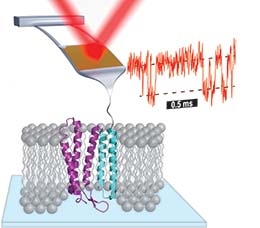
In the Perkins group, we develop and apply high-precision single-molecule techniques—atomic force microscopy (AFM) and optical traps—to address outstanding questions in a wide range of biological systems. Ongoing projects include elucidating the energetics and folding dynamics of membrane proteins embedded in their native lipid bilayer, characterizing the force needed to extract tubulin from a microtubule, probing the nanomechanics of myosin, and studying the motion of helicases along DNA. Our biological goals often motivate improvements in single-molecule techniques, such as developing focused-ion-beam-modified AFM cantilevers, an optical-trapping microscope with 1 Å stability in 3D, efficient site-specific conjugation strategies, and novel DNA- and protein-based constructs.


 The Physics Frontiers Centers (PFC) program supports university-based centers and institutes where the collective efforts of a larger group of individuals can enable transformational advances in the most promising research areas. The program is designed to foster major breakthroughs at the intellectual frontiers of physics by providing needed resources such as combinations of talents, skills, disciplines, and/or specialized infrastructure, not usually available to individual investigators or small groups, in an environment in which the collective efforts of the larger group can be shown to be seminal to promoting significant progress in the science and the education of students. PFCs also include creative, substantive activities aimed at enhancing education, broadening participation of traditionally underrepresented groups, and outreach to the scientific community and general public.
The Physics Frontiers Centers (PFC) program supports university-based centers and institutes where the collective efforts of a larger group of individuals can enable transformational advances in the most promising research areas. The program is designed to foster major breakthroughs at the intellectual frontiers of physics by providing needed resources such as combinations of talents, skills, disciplines, and/or specialized infrastructure, not usually available to individual investigators or small groups, in an environment in which the collective efforts of the larger group can be shown to be seminal to promoting significant progress in the science and the education of students. PFCs also include creative, substantive activities aimed at enhancing education, broadening participation of traditionally underrepresented groups, and outreach to the scientific community and general public.